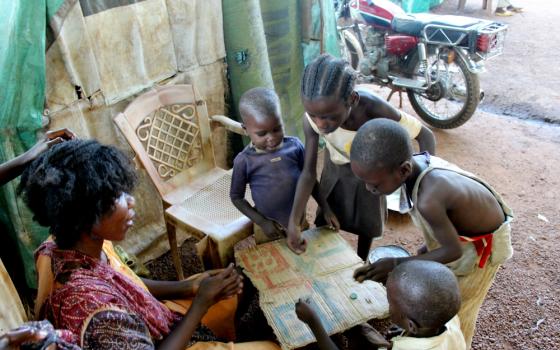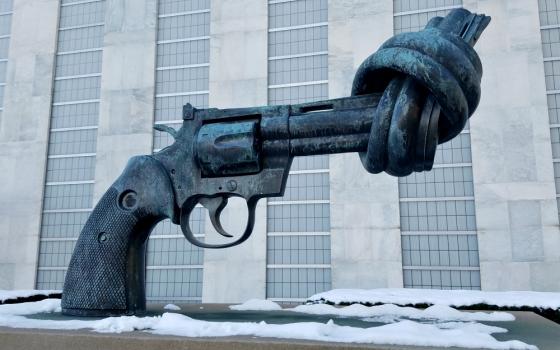These past 12 months mark the year I started to take peace more seriously.
You might ask: Don't all reporters for Global Sisters Report and National Catholic Reporter take peace seriously? It's practically our credo.
We do, of course, and certainly peace is something I have seen as an aspiration and hope after traveling to and reporting in countries where violence, war and poverty are all too common.
But a few things happened in 2017 on my reporter's beat to make the goal of peace more tangible and urgent for me.
The first? Being further awakened to the effects of war on real people. Spending time with those who have survived the costly — and, I have to say, unnecessary — four-year civil war in South Sudan, I witnessed resilience, strength and grace. But during my assignment to the war-torn country in May, I also saw and felt how being displaced, losing a family member and facing months, maybe even years, of uncertainty can cut into a life.
I remember meeting nursing and midwifery students at the Catholic Health Training Institute just outside the city center of Wau, a community deeply affected by war and trying to find a sense of stability after long periods of violence.
In interviews arranged by Sr. Leema Rose, a member of the Missionary Sisters, Servants of the Holy Spirit, and director of the institute, I heard variations of the same story: Students' family members were killed or displaced, and the students felt guilty that they were not with their lost family members when they died.
The students also realized that revenge against the killers — the likely perpetrators often, though not always, government soldiers — is wrong and futile. And yet, understandably, they want to see justice appropriated against those who killed their loved ones.
"It is not for us to do a bad thing," a male nursing student whose father had been killed the month before said about revenge. But, he asked, "who will change the current situation?"
Following the law, the student said, "is the only solution."
But in a country shorn of the rule of law, what is a person to do?
If revenge keeps on, "the cycle continues — and that's why war doesn't stop," said the student, who is from the city of Rumbek. He, like others I interviewed at the institute, did not want to be publicly identified for fear of reprisal. His fear and the fear of others were real and tangible.
At the same time, the student's idealism remained intact: His goal upon finishing his studies is to provide medical care for "my people," as he put it.
That was heartening. Rose and others at the institute are doing their best to keep a sense of integrity about the world around them and their students.
I had a sense of real spiritual peace while I stayed at the institute — I was there at a calm moment. But I was also profoundly aware that peace was fragile at best in Wau and could end at a moment's notice with a bombardment or string of bullets.
I kept thinking about war's effects long after I returned home from South Sudan and carried them with me as I covered a major story for the United Nations: the decision July 7 by 122 countries to approve an agreement outlawing nuclear weapons, a milestone in grassroots organizing that helped a coalition of anti-nuclear-arms activists win this year's Nobel Peace Prize.
One of those who helped me bridge my experiences in South Sudan with what I covered at the United Nations is Zimbabwean Maryknoll Sr. Elizabeth Zwareva, who is completing her ministry at the Maryknoll Office for Global Concerns and who has been a helpful source of information, perspective and hope.
I asked Zwareva earlier this year about war's effects both in places like South Sudan and in the context of nuclear war, and she had this to say:
I do not think that the effects of war will ever end because wars affect the lives of real people. War has deep psychological, spiritual, physical and moral wounds that remain engraved in one's soul. The survivors of the Hiroshima and Nagasaki atomic bombs are still living witnesses of what happens when wars are fought and, in a special way, wars in which the nuclear bomb was used to destroy not only human lives but the Earth itself upon which the bomb fell.
Today, we are dealing with the effects of war like never before. Soldiers come home wounded, debilitated and with post-traumatic disorders that lead to many other ills, while widows of soldiers killed are left to struggle with their loneliness and pain.
Zwareva and other sisters who work at the United Nations are a good mixture of pragmatism and idealism. They know peace is not about to break out in the world, and they know the realities of global politics and power dynamics at the U.N., where the United States and other powerful countries still dominate the world body. But the sisters believe deeply that their ministry at the U.N. is to keep that commitment to peace and justice salient and alive.
They often succeed. Earlier this month, on Dec. 11, sisters and others who work at the United Nations attended a ceremony heralding the start of a yearlong series of commemorations marking the 70th anniversary of the Universal Declaration of Human Rights, which the U.N. adopted in 1948.
In his remarks that day, U.N. Secretary-General António Guterres acknowledged, "In practice, recognition of the inherent dignity and equal rights of human beings is still far from universal. Millions of people continue to suffer human rights violations and abuses around the world."
And yet, he noted, "over seven decades, humanity has achieved considerable progress."
"People around the world have gained progressively greater freedoms and equality," he said. "They have been empowered to oppose discrimination, fight for protections, and gain greater access to justice, health, education and development opportunities. Conditions of profound economic misery and exploitation have been improved."
Guterres added: "Women's rights have advanced, along with the rights of the child, the rights of victims of racial and religious discrimination, the rights of people with disabilities, and a multitude of economic, social and cultural rights. Oppressive dictatorships have been replaced by participatory systems of governance."
The work of Catholic sisters, their congregations, the wider church and its vast humanitarian network has played a part in that progress.
War, of course, has not been eliminated, and violence continues to make its mark in countries like South Sudan. But as Guterres rightly pointed out, "The founders of the United Nations were right. Lasting peace and security can never be achieved in any country without respect for human rights."
That respect is bound up with the notion that war is a detriment to the kind of sustainable peace that the sisters I know — be they in South Sudan or at the United Nations — are working toward.
In October, Sr. Stacy Hanrahan, who represents the Congregation of Notre Dame at the U.N. and is active in U.N.-based nuclear-disarmament efforts, sent me a prayer she offered at a meeting of congregations of women and men religious at the United Nations. In it, Hanrahan quoted Mohandas Gandhi, who said, "Nonviolence is the greatest force at the disposal of humanity. It is mightier than the mightiest weapon of destruction devised by the ingenuity of humanity."
Gandhi acknowledged, "We have to make truth and nonviolence not matters for mere individual practice, but for practice by groups and communities and nations." His conclusion? "When the practice of nonviolence becomes universal, God will reign on Earth as God reigns in heaven."
As the year ends, count this journalist as believing that Gandhi and the Catholic sisters I know are right.
[Chris Herlinger is GSR international correspondent. His email address is [email protected].]



